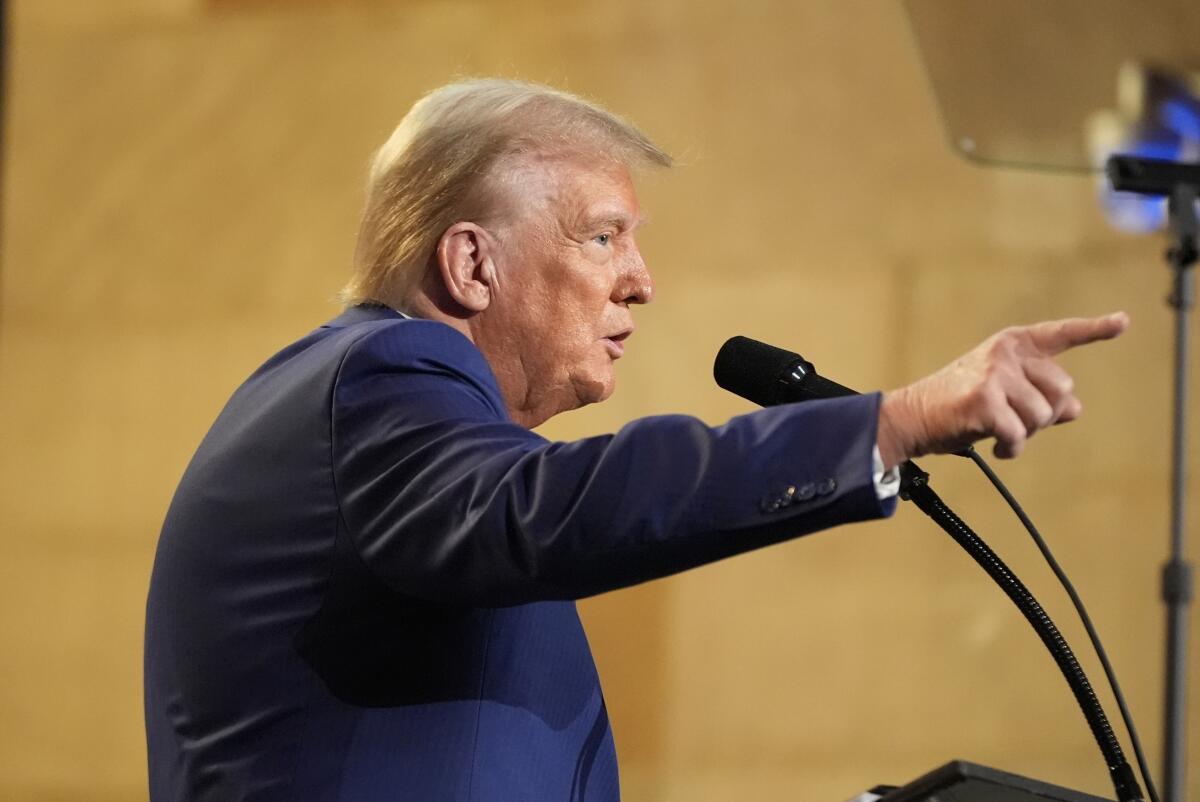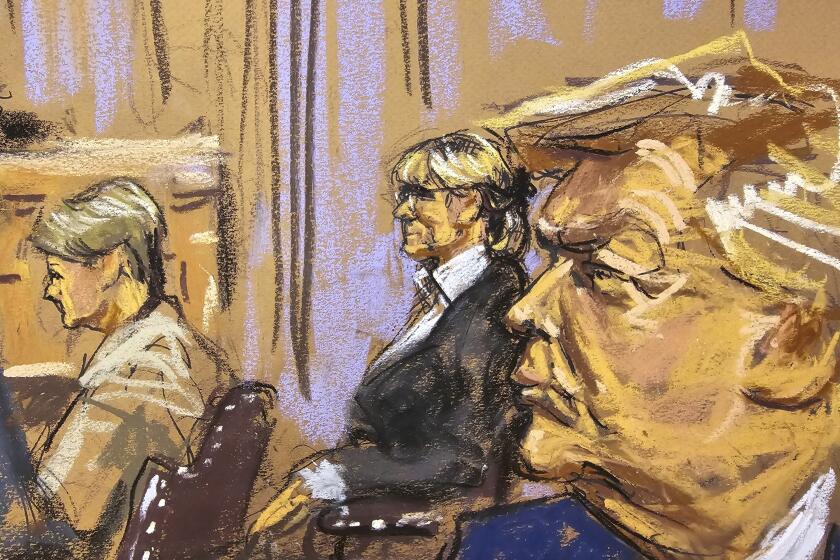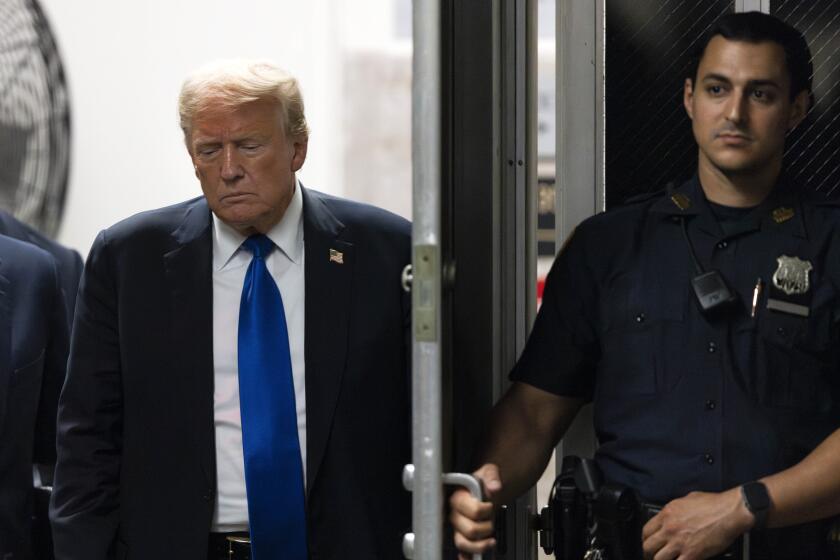Judge delays Trump’s sentencing in felony conviction until after November election

- Share via
NEW YORK — A judge agreed Friday to postpone Donald Trump’s sentencing in his hush money case until after the November election, granting him a reprieve as he navigates the aftermath of his criminal conviction and the homestretch of his presidential campaign.
Manhattan Judge Juan M. Merchan, who is also weighing a defense request to overturn the verdict on immunity grounds, delayed Trump’s sentencing until Nov. 26, several weeks after the final votes are cast in the presidential election.
Sentencing had been scheduled for Sept. 18, about seven weeks before election day. The new date is the Tuesday before Thanksgiving.
The delay means the presidential election will be decided without voters knowing whether the Republican nominee is going to jail for his felony conviction.
Merchan explained in a four-page decision that he was postponing sentencing “to avoid any appearance — however unwarranted — that the proceeding has been affected by or seeks to affect the approaching presidential election in which the Defendant is a candidate.”
“The Court is a fair, impartial, and apolitical institution,” he added.
Trump’s lawyers pushed for the delay on multiple fronts, petitioning the judge and asking a federal court to intervene. They argued that punishing the Republican nominee in the thick of the presidential campaign would amount to election interference.
They also argued that delaying his sentencing until after the election would allow him time to weigh next steps after Merchan rules on the defense’s request to reverse his conviction and dismiss the case because of the U.S. Supreme Court’s July presidential immunity ruling.
Former President Trump returned to court in New York as his lawyer fought to overturn a verdict finding Trump liable for sexual abuse and slander.
In his order Friday, Merchan delayed a decision on that until Nov. 12. It had been set for Sept. 16.
A federal judge Tuesday rejected Trump’s request to have the U.S. District Court in Manhattan seize the case from Merchan’s state court. Had they been successful, Trump’s lawyers said they would have then sought to have the verdict overturned and the case dismissed on immunity grounds.
Trump is appealing the federal court decision and asked the 2nd U.S. Circuit Court of Appeals to halt post-conviction proceedings. That court has not yet ruled.
Trump, in New York for arguments in another court case, lauded the delay in a post on his social media platform.
“The Manhattan D.A. Witch Hunt has been postponed because everyone realizes that there was NO CASE, I DID NOTHING WRONG!” he wrote. He assailed the case as “a political attack.”
Manhattan Dist. Atty. Alvin Bragg, who brought the case, is a Democrat. His office didn’t take a position on Trump’s delay request, deferring to Merchan.
“A jury of 12 New Yorkers swiftly and unanimously convicted Donald Trump of 34 felony counts,” spokesperson Danielle Filson said. The office, she said, “stands ready for sentencing on the new date set by the court.”
Jurors deliberated for 9½ hours over two days before convicting former President Trump of all 34 counts he faced in a hush-money scheme surrounding the 2016 election.
Trump entered this election year facing the possibility of multiple criminal trials after he was indicted four times since March 2023. But a string of decisions in the last two months, culminating with Friday’s sentencing delay, has largely cleared his legal calendar. The hush money case is the only one to have gone to trial.
In July, a judge dismissed a federal case in Florida charging Trump with illegally hoarding classified documents and obstructing investigators. At the same time, the Supreme Court’s immunity decision has ensured significant delays in a separate federal case in Washington, D.C., in which Trump is criminally charged for trying to overturn his 2020 election loss. A Georgia election case, for his attempts to reverse his 2020 loss in that state, also remains idled.
Election day is Nov. 5, but many states allow voters to cast ballots early, with some set to start the process just a few days before or after the original sentencing date of Sept. 18.
Trump was convicted in May on 34 counts of falsifying business records to conceal a $130,000 hush money payment to porn actor Stormy Daniels just before the 2016 presidential election. Daniels says she and Trump had a sexual encounter a decade earlier after they met at a celebrity golf tournament in Lake Tahoe.
Prosecutors cast the payout as part of a Trump-driven effort to keep voters from hearing salacious stories about him during his first presidential campaign. Trump’s former lawyer Michael Cohen paid Daniels and was later reimbursed by Trump, whose company logged the reimbursements as legal expenses.
Trump maintains that the stories were false, that reimbursements were for legal work and logged correctly, and that the case was part of a politically motivated “witch hunt” aimed at damaging his current campaign.
Democrats backing their party’s nominee, Vice President Kamala Harris, have made his conviction a focus of their messaging.
In speeches at the party’s conviction in Chicago last month, President Biden called Trump a “convicted felon” running against a former prosecutor. Rep. Jasmine Crockett (D-Texas) labeled Trump a “career criminal, with 34 felonies, two impeachments and one porn star to prove it.”
Trump’s 2016 Democratic opponent, former Secretary of State Hillary Clinton, quipped in her convention speech that Trump “fell asleep at his own trial, and when he woke up, he made his own kind of history: the first person to run for president with 34 felony convictions.”
Falsifying business records is punishable by up to four years behind bars. Other potential sentences include probation, a fine or a conditional discharge, which would require Trump to stay out of trouble to avoid additional punishment. Trump is the first ex-president convicted of a crime.
The Palestinian militant group Hamas released a video of California-born Hersh Goldberg-Polin, who was killed with 5 other Israeli hostages in Gaza.
Trump has pledged to appeal, but that cannot happen until he is sentenced.
In seeking the delay, Trump lawyers Todd Blanche and Emil Bove argued that the short time between the scheduled immunity ruling on Sept. 16 and sentencing two days later was unfair to Trump.
To prepare for a Sept. 18 sentencing, the lawyers said, prosecutors would be submitting their punishment recommendation while Merchan is still weighing whether to dismiss the case. If Merchan rules against Trump, he would need “adequate time to assess and pursue state and federal appellate options,” they said.
The Supreme Court’s immunity decision limits prosecutions of ex-presidents for official acts and restricts prosecutors in pointing to official acts as evidence that a president’s unofficial actions were illegal.
Trump’s lawyers argue that in light of the ruling, jurors in the hush money case should not have heard such evidence as former White House staffers describing how the then-president reacted to news coverage of the Daniels deal.
Sisak and Peltz write for the Associated Press.
More to Read
Get the L.A. Times Politics newsletter
Deeply reported insights into legislation, politics and policy from Sacramento, Washington and beyond. In your inbox twice per week.
You may occasionally receive promotional content from the Los Angeles Times.












